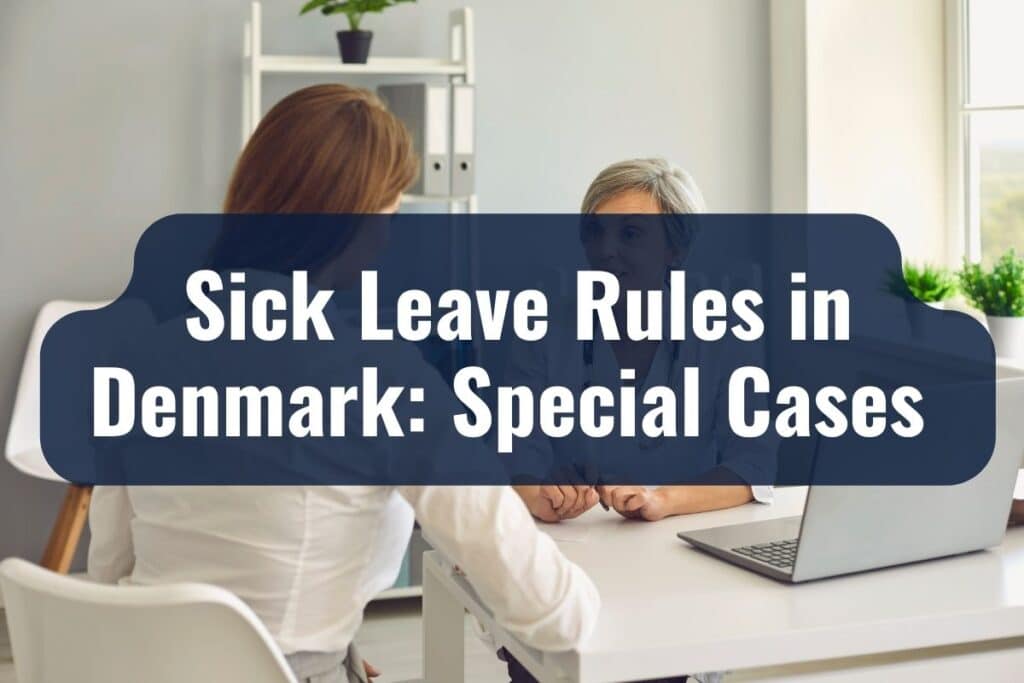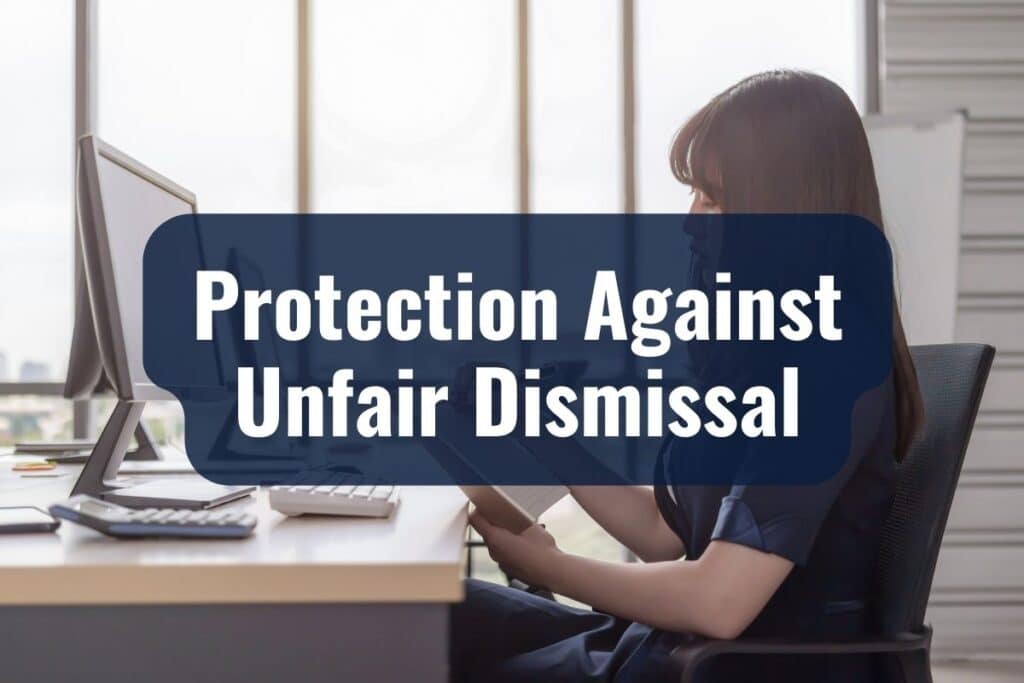Sick leave isn’t just about taking a day off when you’re feeling under the weather. It’s about ensuring that employees can recover fully without the worry of financial instability or job insecurity. Denmark’s approach to sick leave embodies the nation’s broader commitment to work-life balance and the holistic well-being of its workforce.
At the heart of Denmark’s labor market is the welfare system. It is designed to provide security to workers and their families during times of need, whether it’s due to illness, unemployment, or other life challenges.
In this article we’ll take a look at the sick leave rules in Denmark.
Key Takeaways
- Danish sick leave rules prioritize employee well-being and protection.
- Employees are entitled to sick leave, but communication with employers is essential.
- Documentation, especially for prolonged illnesses, might be required by employers.
- Duration of paid sick leave varies, often with employer compensation followed by municipal benefits.
- Special cases, like pregnancy, have unique considerations in the realm of sick leave.
- Unfair dismissal on health grounds is protected against, but employers have fair dismissal rights under certain conditions.
The Basic Right to Sick Leave
In Denmark, the well-being of the workforce is central to the employment ecosystem. As a reflection of this ethos, employees are accorded certain rights when it comes to sick leave, ensuring they can focus on recovery without undue concerns about their employment status.
What Constitutes the Right to Sick Leave?
In Denmark, every employee, whether full-time, part-time, or on a temporary contract, is entitled to sick leave if they are unable to perform their work duties due to illness. This encompasses both physical and mental health issues.
Conditions for Taking Sick Leave
Immediate Notification: Employees are expected to notify their employer on the first day of their illness. The specifics of this might be detailed in your employment contract, but as a general rule, the sooner the employer is informed, the better.
Validity of the Illness: While Denmark has a trust-based system, if there’s any doubt about the validity of the illness, employers may request medical documentation or evidence confirming the reason for the leave.
Duration of Employment: Your entitlement to sick leave pay might vary based on the length of your employment. While the basic right to sick leave is universally applicable, how long you’ve been employed could influence the compensation you receive during this period.

Notification and Documentation
Navigating the sick leave process in Denmark requires a clear understanding of the notification and documentation protocols. Being well-informed ensures that the process is smooth for both the employee and the employer, maintaining transparency and trust in the employment relationship.
How to Notify Your Employer
The primary responsibility of an employee, when they realize they’re too ill to work, is to inform their employer. The specifics of how this is done can vary based on company policies, but here are some general guidelines:
Timeliness: Notify your employer as soon as possible, preferably before your workday begins. This allows the employer to make necessary adjustments in your absence.
Preferred Channels: While some employers may prefer a phone call, others might accept emails or messages through company communication platforms. Always check your employment contract or company’s HR guidelines to ensure you’re using the preferred method.
Details to Provide: Typically, when notifying your employer, you don’t need to provide extensive details about your illness. A brief explanation and an estimated duration of your absence (if possible) are usually sufficient.
The Importance of Timely Notification
Timely communication is pivotal in maintaining trust. By informing your employer promptly:
1. It displays professionalism and consideration for the operational needs of your workplace.
2. It allows for better planning and distribution of tasks in your absence.
Requirements for Providing Medical Documentation
While the Danish system is built on mutual trust, there might be occasions when an employer requires more concrete evidence of your illness. Here’s what you should know:
When is a Doctor’s Note Needed? Employers usually request a doctor’s note or medical documentation if the sick leave extends beyond a specified period, often detailed in the employment contract.
Who Bears the Cost? If your employer requests a medical certificate within the first 30 days of your sick leave, they are responsible for covering the expense. However, after this period, costs may be borne by the employee, unless otherwise specified in the employment agreement.
Protection of Medical Information: Remember, while you might be asked for a doctor’s note, you’re not obligated to disclose detailed medical information to your employer. The note should simply confirm your inability to work due to health reasons without necessarily delving into specifics.
Related: Pharmacies in Denmark:
Duration and Pay during Sick Leave
One of the primary concerns for employees when taking sick leave is the duration they can be absent and how it impacts their income. Denmark’s labor laws and welfare system have provisions that ensure employees do not face undue financial hardship during these periods.
Duration of Sick Leave
The duration of sick leave an employee can take primarily depends on the nature of the illness and the recovery time recommended by a medical professional. However, there are certain general guidelines to be aware of:
Maximum Duration: The standard period for which an employer pays sick leave benefits is usually up to 30 days. After this period, the municipality often steps in to assess if further benefits can be provided based on the employee’s circumstances.
Extended Illness: In cases of prolonged illness, the municipality can provide sickness benefits for up to 22 weeks, which can be extended under specific conditions if the person is unable to work beyond this period.
Pay during Sick Leave
The compensation received during sick leave is determined by several factors:
Employment Contract: Many contracts have provisions detailing sick leave pay. Usually, employees will receive their regular salary during their absence, but it’s essential to check specific terms in your employment agreement.
Collective Agreements: In sectors where collective agreements are prevalent, these agreements often dictate the terms of sick leave compensation. Such agreements can sometimes offer more favorable terms than individual employment contracts.
Municipality Benefits: As mentioned earlier, if the sick leave extends beyond the typical 30-day employer-paid period, the local municipality may step in to offer sickness benefits. The amount can vary based on the employee’s previous income, the nature of their illness, and other factors.
The Role of the Employer and the Local Municipality
Both the employer and the local municipality play pivotal roles in ensuring the well-being of the employee during periods of illness:
- Employer’s Role:
- Provide sick leave compensation as per the employment contract or collective agreement.
- Maintain open communication with the employee, ensuring they are aware of their rights and any necessary documentation.
- Local Municipality’s Role:
- Assess and provide sickness benefits for extended periods of illness.
- Offer guidance and resources to employees on their rights and the process for claiming benefits.
Sick Leave Rules in Denmark: Special Cases

While the general rules around sick leave in Denmark are designed to cover the most common scenarios, there are certain special cases that may require additional understanding. Recognizing these exceptions ensures that employees are well-informed and can make decisions aligned with their specific situations.
Sick Leave during the Probationary Period
The probationary period, typically the initial months of employment, often comes with its own set of regulations. Here’s what you should know about sick leave during this time:
Right to Sick Leave: Even during the probationary period, employees retain their right to sick leave. However, the terms of compensation might differ based on the employment contract.
Termination Concerns: While it’s illegal to dismiss an employee solely based on illness, the probationary period can be a sensitive time. If an employee feels they were unfairly let go due to sickness, they may have grounds for a legal challenge.
Sick Leave during Maternity/Paternity Leave
Maternity and paternity leaves are significant life events, and the overlap with sick leave can create unique situations:
Concurrent Illness: If an employee falls sick during their maternity/paternity leave, the sick leave and maternity/paternity leave can run concurrently. This means one doesn’t typically extend the other.
Compensation: Compensation during this period would be in line with the terms of maternity/paternity benefits, not regular sick leave pay.
Chronic Illnesses or Longer-Term Health Issues
For those dealing with chronic illnesses or health issues that require longer periods away from work:
Extended Benefits: As mentioned earlier, the municipality can provide sickness benefits beyond the standard 30 days if the employee is unable to resume work due to prolonged health issues.
Job Reintegration: The Danish system focuses on reintegrating employees with chronic illnesses back into the workforce. This might involve offering them modified job roles, flexible hours, or other accommodations to help them transition back smoothly.
Protection Against Discrimination: Employees with chronic or long-term health issues are protected against discrimination. Employers cannot treat them unfavorably due to their health status, and any such actions can have legal repercussions.
Related: Private Hospitals in Denmark: What To Expect
Returning to Work After Sick Leave
Resuming work after a period of illness requires careful consideration and sometimes a few adjustments to ensure the transition is smooth and conducive to the employee’s continued recovery. Danish work culture and regulations provide frameworks that support and facilitate this return, keeping in mind the well-being of the individual.
Steps and Processes for Rejoining
- Clearance: If the period of sick leave was extended, or if there’s a need for any work-related adjustments due to the nature of the illness, employees might require medical clearance to resume their roles.
- Communication with Employer: It’s crucial to maintain open dialogue with your employer about your readiness to return and any adjustments you might need. This could relate to work hours, tasks, or any other aspect of your role.
- Gradual Reintegration: Depending on the nature and duration of the illness, there might be a phased approach to rejoining. This could involve starting with part-time hours, modifying specific job duties, or any other measure that aids in a smoother transition.
Rights of the Employee During the Transition Phase
Right to Flexibility: An employee returning from prolonged sick leave might have the right to request flexibility in terms of hours or responsibilities, especially if supported by medical advice.
Protection Against Discrimination: Resuming work after a period of illness should not result in any form of discrimination. Employees should be treated with the same respect and consideration as any other member of the workforce.
Confidentiality: While open communication with the employer is encouraged, employees retain the right to confidentiality regarding the specifics of their medical conditions.
Termination Due to Prolonged Sickness
In rare cases, if an employee is unable to return to work even after extended periods of sick leave and after all potential adjustments and support measures have been considered, termination might be discussed. However, such decisions:
- Must Be Justifiable: The decision to terminate should be based on the genuine inability of the employee to perform their role, even with adjustments.
- Require Proper Documentation: Any decision to terminate due to prolonged sickness should be well-documented, highlighting all the measures taken to support the employee’s return.
- Legal Protections: Employees have legal rights and can seek counsel if they feel the termination was not justified or if they faced discrimination.
Protection Against Unfair Dismissal

One of the cornerstones of the Danish employment landscape is the emphasis on employee rights and protections. Central to this is the assurance that employees are not subject to arbitrary or unfair dismissals, especially when it pertains to health-related absences. Understanding these protections is crucial for anyone navigating the world of work in Denmark.
The Grounds for Fair Dismissal
While employers in Denmark have the right to dismiss employees under certain conditions, these must be justified and in good faith. Some legitimate grounds for dismissal might include:
Economic Reasons: This could involve company-wide layoffs due to financial challenges or restructuring.
Employee Conduct: Repeated misconduct or breaches of company policy can be grounds for dismissal.
Inability to Perform Job Role: If, even after significant support and adjustments, an employee is unable to fulfill their job responsibilities, it might be a basis for dismissal.
Illness and Dismissal: What’s Protected?
Short-Term Illness: Dismissing an employee due to short-term illnesses is not considered fair or justified. Employees are entitled to recover from brief health challenges without fearing for their job security.
Extended Illness: Even in cases of prolonged health issues, dismissal should be a last resort. Employers must demonstrate that the continued absence of the employee severely impacts the operations of the company and that no reasonable adjustments could facilitate the employee’s return.
Required Documentation: Employers must have comprehensive documentation if they are considering dismissal on the grounds of prolonged illness. This should show evidence of the disruption caused by the employee’s absence and the efforts made to reintegrate the employee.
Legal Recourse in Cases of Unfair Dismissal
Seeking Mediation: Before escalating matters, many cases are referred to mediation, where both parties can discuss concerns and seek resolutions.
Legal Action: If an employee believes they were unfairly dismissed due to their health or any other protected reason, they can initiate legal proceedings. The Danish legal system provides avenues for employees to challenge such dismissals and seek remedies.
Compensation: If it’s proven that an employee was unfairly dismissed, they might be entitled to compensation, which can vary based on the specifics of the case and the duration of their employment.
Union Support: For those who are members of a trade union, the union can provide support, advice, and representation in cases of unfair dismissal.
Additional Resources
The Human Resources (HR) department in most organizations is equipped to provide information and guidance on sick leave policies specific to the company. They can clarify any doubts, guide you through the necessary paperwork, and explain the terms of your employment contract.
For those who are members of a trade union, these organizations offer a wealth of support:
- Advice and Information: Trade unions can provide information on sick leave rights, collective agreements, and more.
- Representation: In case of disputes or concerns regarding sick leave or related matters, trade unions can represent and support their members.
Local municipality offices are essential resources, especially for extended sick leave situations:
- Sickness Benefits: After the standard employer-paid sick leave duration, the municipality can step in to provide benefits.
- Guidance: They offer guidance on claiming these benefits and understanding your rights.
This authority oversees workplace conditions and employee rights in Denmark. Their website and offices have:
- Guidelines: Detailed guidelines on sick leave, employee rights, and related subjects.
- Helplines: They offer helplines for employees to discuss concerns or seek clarifications.
For situations that may require legal interpretation or if an employee believes they’ve faced unfair treatment:
- Legal Professionals: There are attorneys and legal firms specializing in employment law. They can offer advice, representation, and assistance.
- Free Legal Clinics: Some organizations offer free legal clinics or advice sessions for workers seeking guidance on their rights.
FAQs
Do I need to provide a medical certificate for a one-day sick leave?
Typically, for short durations like one-day absences, employers do not require a medical certificate. However, it’s essential to inform your employer of your absence as soon as possible. If there are repeated short-term absences, an employer might request documentation.
Can my employer refuse to grant sick leave?
No, an employer cannot deny you sick leave if you’re genuinely ill. However, they can request documentation or a doctor’s note, especially if the sick leave extends beyond a certain period.
What happens if I fall sick during my vacation?
If you fall ill during your vacation, and the illness is certified by a doctor, you can typically have those vacation days reclassified as sick leave days, ensuring that you don’t lose your vacation entitlement.
Can I take sick leave for mental health reasons?
Yes, sick leave in Denmark covers both physical and mental health challenges. If you’re facing mental health issues that prevent you from working, you have the same rights and protections as someone with a physical illness.
How do I approach long-term sick leave due to chronic conditions?
For long-term or chronic conditions, open communication with your employer is essential. They might be able to offer flexibility, like adjusted hours or responsibilities. If the illness extends beyond the typical employer-paid sick leave period, you might be eligible for benefits from the local municipality.
Are part-time or temporary workers entitled to sick leave?
Yes, part-time and temporary workers have the right to sick leave. However, the specifics of their compensation during this period might vary based on their contract and the hours they work.
If I’m pregnant and face health complications, can I take sick leave?
Absolutely. Pregnancy-related health complications are valid grounds for sick leave. It’s essential to notify your employer and provide any required documentation.